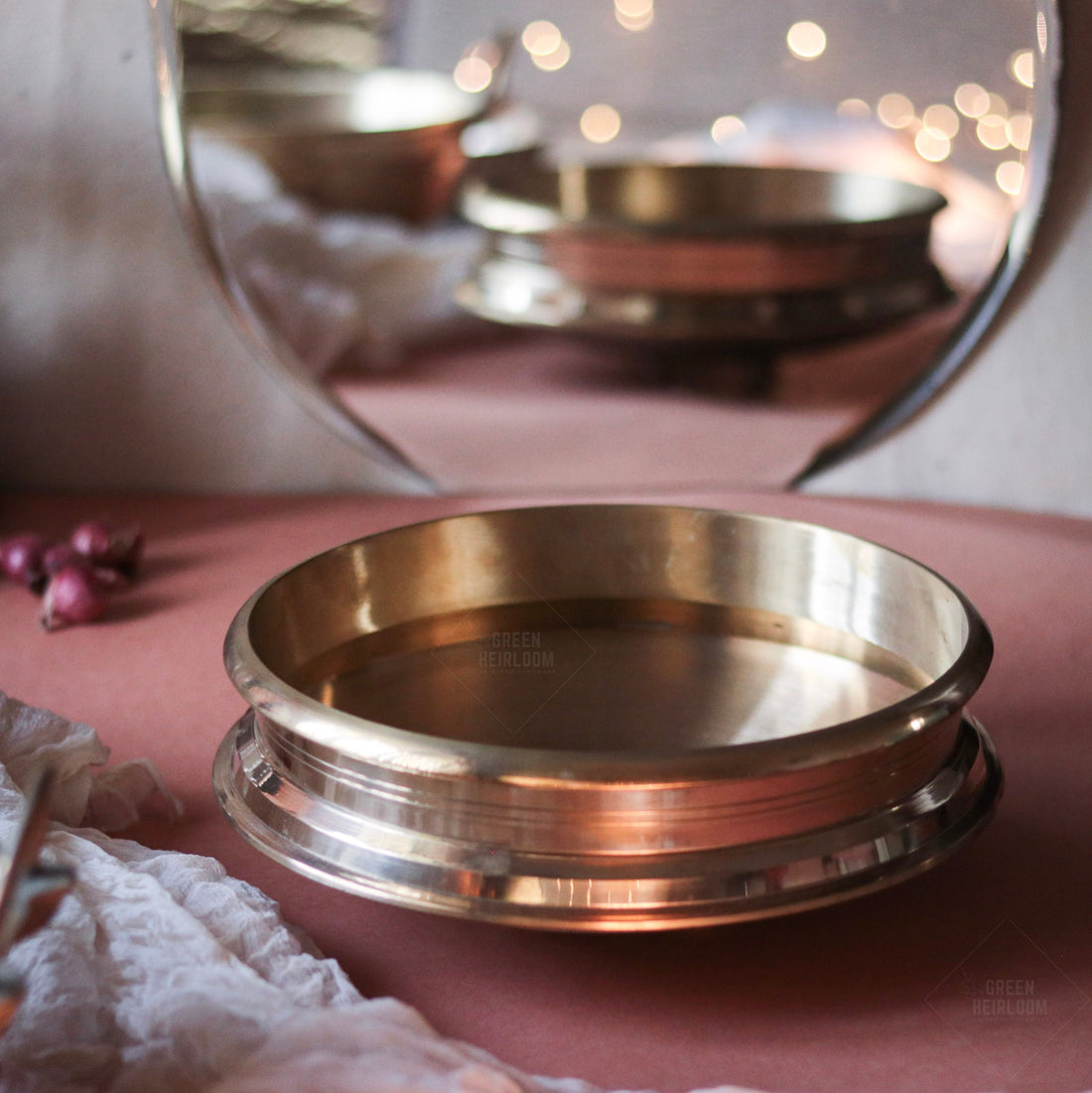
How to Season and Maintain Traditional Indian Cookware
Share
The Basics: What is seasoning?
We season our products to ensure that they bring out the true flavours involved in traditional cooking, steeped in tradition and culture. In other words, we are taming the rough/new utensil to ensure that you get the maximum out of the cookware range - taste wise and health wise. Seasoning also ensures that your cookware is not prone to corrosion and that it will last for a longer period. Generous seasoning also ensures that your food doesn’t stick to the bottom, ensuring hassle free cooking.
Caring for your cookware
Cast Iron
All our cast iron products are delivered pre-seasoned. This is to save you the trouble of a process which can last for a few days. However, over time you might see small patches of rust developing. This is perfectly normal and indicates that it is time to re season. This an easy procedure and can be done as follows;
- First scrub off the rust patches using a steel scrubber. You can use a mild detergent to aid the process. Rinse it out.
- Next rub down the cookware with salt and heat it on the stove-top to ensure every bit of moisture is also removed.
- Take some oil and coat it across the entire surface of the cookware. Put it back on the stove top and heat till it becomes very hot. Switch off and wait till the pan cools down.
- Repeat the process of applying oil , heating it and cooling down few more times.
- Wipe the pan dry and store in a dry place.
Care tips:
- After each use scrape out the bits at the bottom of the pan by generously applying salt to it. In case of stubborn bits stuck to the bottom you may use a wooden / plastic spatula.
- If required, use a mild detergent. We would recommend against it unless you are re-seasoning the item. However, do not soak the cookware in soap solution.
- Once you are done cleaning, pat down the cookware to ensure there is no moisture left on it. And then you can pop it back on the stove to give a quick dry.
- Dab a small amount of oil all over the insides.
- Store in a dry area.

Bronze
There are different ways to season bronze cookware, ranging from the use of rice husk to ash. The process is spread across a few days and requires lot of scrubbing. Do not fret, for the seasoning process has already been done for your cookware. You just need to follow the directions given below to maintain it.
Care Tips:
- Do not use abrasive detergents and powders on your cookware as the metal is prone to react.
- Rinse the cookware with water and use a sponge to clean.
- Pat dry and store in a dry place
- Do not add boiling water to a cool pan or cold water to a hot pan. This may cause the metal to crack.
- If there are tough stains, mix 1 teaspoon of salt in ½ cup white vinegar and some flour to make a paste. Apply it to the insides and let it sit for 20-30 minutes. Rinse clean and pat it dry. Make sure you do this only once in a while.
- Alternatively, you can also make a paste of baking soda and white vinegar and add rice flour to it. Apply the paste throughout in circular motions. Scrub off using a sponge. Rinse and dry.
- You can also sprinkle some salt on to the cookware and use a small ball of tamarind to work across the surface. Rinse and dry afterwards.

Soapstone
Seasoning your soapstone cookware is a four day affair involving copious amounts of oil and turmeric and requiring a fair amount of rinsing and drying. This has already been done for you. Ideally, add a teaspoon of salt and turmeric powder to water and bring it to a boil and let it cool down before use. Please note that Soapstone retains heat for a very long period and hence exercise caution while touching the pot.
Care Tips:
- Make sure that your soapstone cookware is at room temperature before you wash it. Otherwise this can lead to formation of cracks
- To clean after using, rinse and remove the food remains.
- If you want to clean it further, fill the pot with water and put it on the stove top. The food particles will start detaching from the surface of the pot and start floating. Wait for the water to cool down and rinse it again.
- You can use a sponge or soft cloth to clean and dry the cookware.
- Ideally, leave it to out in the sun so that it dries up naturally.
- Do not use soap or detergents at any point as soapstone is porous and will absorb the chemicals. This will be later released into your food when cooking, negating the positive effects the cookware.

Clay pots
In our clay pot range, the blackened ones are pre-seasoned. To season your clay pots you can use one of the following alternatives:
- Rinse and dry your cookware to ensure all dirt is removed.
- Fill to the brim with rice water starch and bring to boil on low flame.
- Keep it aside to cool. The next day rinse the cookware and repeat the process for 3 days.
- After the 3rd rinse, pat dry utensil and dab oil all over. Keep aside for 4-6hours.
- Before you start cooking your curries, frying some onions will help. Add some oil to the cookware and keep it on the stove on low flame. Add chopped onions and saute. Ensure the onions move all over the cookware.
- Let it cool. Rinse and dry.
- We have also come across instances where water is boiled with generous amount of tea in order to season it.
Care Tips:
- Since clay pots ensure food doesn’t stick to the bottom, cleaning it is relatively easier
- Rinse with water to remove large particles and use a sponge or cloth to give it a good scrub.
- Do not use any cleaning agents as clay is porous and the chemicals will be absorbed in by the cookware.
- Once the primary rinse is done, pop it on the stove with water, a slice of lemon and a pinch of baking soda. Bring the water to boil.
- Rinse once again and pat dry.
- Place it on stove to remove any excess moisture. Alternatively you can sun dry it.
- Store in a dry place.

